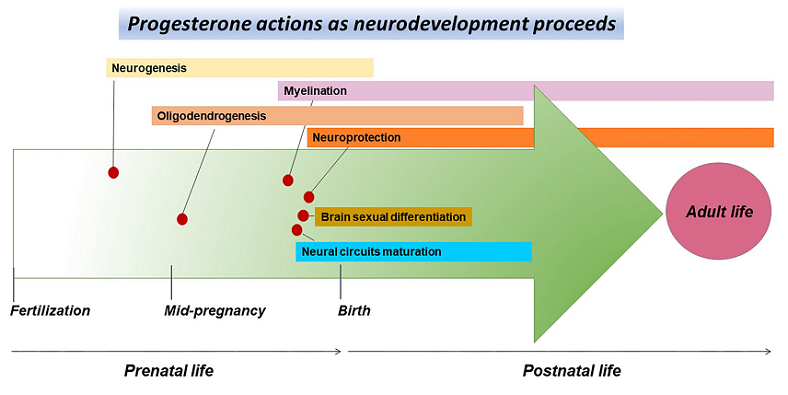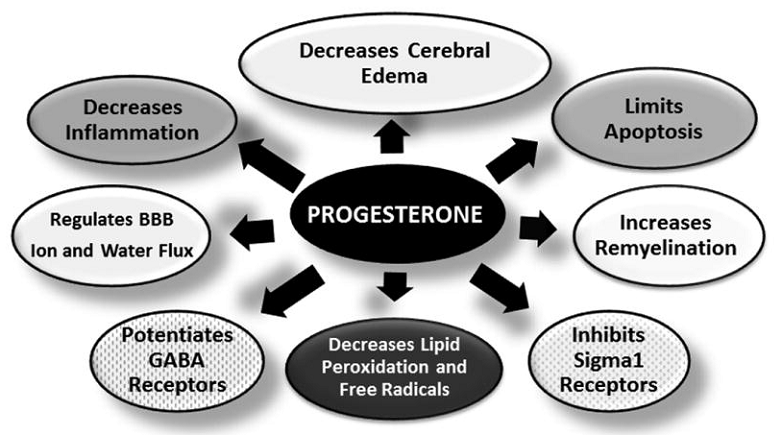
In recent years, the importance of understanding the intricate connection between hormones and brain health has come to the forefront of scientific research. Among the numerous hormones that play a vital role in maintaining cognitive function, one in particular has gained significant attention for its neuroprotective properties: progesterone. Though traditionally associated with reproductive health, progesterone has been found to exhibit a range of beneficial effects on the brain.
Contents
What Is Progesterone?
Progesterone is a steroid hormone that plays a crucial role in various physiological processes in both men and women. Although it is primarily known for its involvement in reproductive health, it also has significant effects on other systems, including the brain.
Definition and Role as a Steroid Hormone
Steroid hormones, including progesterone, are synthesized from cholesterol and function as signaling molecules that regulate a wide range of biological processes in the body. Progesterone belongs to a class of hormones called progestogens, which are responsible for regulating the menstrual cycle and maintaining pregnancy [1].
Progesterone Production in the Body
Progesterone is produced mainly in the ovaries in women and the testes in men. In women, progesterone levels fluctuate throughout the menstrual cycle, with the highest levels occurring during the luteal phase, after ovulation, to prepare the uterus for possible implantation of a fertilized egg. The placenta also produces progesterone during pregnancy to maintain a healthy environment for the developing fetus.
In men, progesterone production is relatively constant and plays a role in the production of sperm and the maintenance of libido. Additionally, both men and women have smaller amounts of progesterone produced by the adrenal glands and certain tissues, including the brain.
Importance of Progesterone in Reproductive Health
Progesterone is essential for the regulation of the menstrual cycle, the maintenance of pregnancy, and the development of secondary sexual characteristics in women [2]. It helps to prepare the uterine lining for implantation and fosters a supportive environment for the growth of the embryo. Progesterone also plays a role in breast development and lactation.
In men, progesterone contributes to the production of testosterone and sperm, and it helps regulate the male reproductive system [3]. Although the role of progesterone in men’s reproductive health is not as well understood as in women, it is nonetheless an important hormone for maintaining overall health and well-being.

Progesterone and the Brain
The influence of progesterone extends beyond reproductive health, as it also plays a significant role in brain function and development. Its effects on the brain are mediated through specific receptors and involve modulation of neurotransmitter systems.
Progesterone Receptors in the Brain
Progesterone exerts its effects on the brain by binding to specific progesterone receptors, which are proteins found on the surface of certain brain cells [4]. These receptors are widely distributed throughout the brain, including regions such as the hippocampus, cortex, cerebellum, and hypothalamus. The presence of these receptors indicates that progesterone has a direct impact on various brain functions.
The Role of Progesterone in Brain Development
During prenatal development, progesterone is essential for the proper formation of the brain [5]. It supports the growth and differentiation of neural progenitor cells, which eventually give rise to neurons and glial cells. Progesterone also plays a role in the formation of synapses, the specialized junctions between neurons that allow them to communicate with one another.
In addition to its role in early brain development, progesterone continues to support brain health throughout life by promoting the maintenance and repair of neural tissue.
Progesterone’s Impact on Neurotransmitter Function
Neurotransmitters are chemical messengers that enable communication between neurons. Progesterone influences the function of several neurotransmitter systems, including those involving gamma-aminobutyric acid (GABA), glutamate, and serotonin [6].
Progesterone enhances the function of GABA, the primary inhibitory neurotransmitter in the brain, which helps to regulate neuronal excitability and promote relaxation. It also modulates the activity of glutamate, the main excitatory neurotransmitter, which is involved in learning and memory processes. Furthermore, progesterone has been found to interact with the serotonin system, which plays a crucial role in mood regulation.

Neuroprotective Effects of Progesterone
Emerging research has highlighted the potential of progesterone as a neuroprotective agent, demonstrating its ability to protect and repair the brain under various conditions. Progesterone’s neuroprotective effects can be attributed to several mechanisms, including reducing inflammation and oxidative stress, promoting myelin regeneration and remyelination, enhancing neurogenesis and synaptic plasticity, and inhibiting apoptosis while promoting cell survival.
Reduction of Inflammation and Oxidative Stress
Inflammation and oxidative stress are key contributors to many neurological disorders and can exacerbate brain damage following injury. Progesterone has been shown to reduce inflammation by modulating the activity of immune cells called microglia, which play a role in the brain’s immune response [7]. By inhibiting the production of pro-inflammatory molecules and promoting the release of anti-inflammatory compounds, progesterone helps to maintain a healthy inflammatory balance in the brain.
Additionally, progesterone exhibits antioxidant properties, neutralizing harmful free radicals and reducing oxidative stress. This, in turn, helps to protect brain cells from damage and maintain the integrity of neural tissue.
Promoting Myelin Regeneration and Remyelination
Myelin is a protective sheath that surrounds nerve fibers and ensures the efficient transmission of electrical signals within the nervous system. Damage to myelin can lead to a range of neurological disorders, including multiple sclerosis. Progesterone has been found to promote the regeneration and repair of myelin by stimulating the growth and differentiation of oligodendrocytes, the cells responsible for myelin production [8]. This process, known as remyelination, helps to restore the function of damaged nerve fibers and protect them from further injury.
Enhancing Neurogenesis and Synaptic Plasticity
Neurogenesis, the process of generating new neurons, is essential for maintaining cognitive function and emotional well-being. Progesterone has been shown to stimulate neurogenesis in the hippocampus, a brain region critical for learning and memory [9]. Moreover, progesterone promotes synaptic plasticity, the ability of synapses to change their strength and adapt to new experiences. This is crucial for the formation and consolidation of memories, as well as the brain’s ability to adapt and recover from injury.
Inhibition of Apoptosis and Promotion of Cell Survival
Apoptosis, or programmed cell death, is a natural process that can become dysregulated in certain neurological disorders, leading to excessive cell loss and brain damage. Progesterone has been shown to inhibit apoptosis by modulating the expression of specific genes and proteins involved in this process [10]. By promoting cell survival and preventing the loss of neurons and other brain cells, progesterone helps to preserve the structure and function of the brain, even under conditions of stress or injury.

Clinical Studies and Applications
The neuroprotective effects of progesterone have generated interest in its potential application for the treatment of various neurological disorders and injuries. Clinical studies and trials have investigated the benefits of progesterone in cases of traumatic brain injury, stroke, and neurodegenerative diseases.
Traumatic Brain Injury
Preclinical research using animal models of traumatic brain injury (TBI) has demonstrated that progesterone treatment can reduce brain swelling, inflammation, and cell death while improving functional recovery [11]. These promising results have paved the way for clinical trials in humans.
Although some initial clinical trials have shown that progesterone administration following TBI can improve patient outcomes, more recent larger-scale trials have reported mixed results. The discrepancies in these findings indicate that further research is needed to optimize progesterone treatment protocols for TBI patients and better understand the factors that may influence treatment outcomes.
Stroke
Animal studies have suggested that progesterone can reduce the size of brain lesions and improve neurological function after ischemic stroke (caused by a blocked blood vessel) and hemorrhagic stroke (caused by a ruptured blood vessel) [12]. The proposed mechanisms for these benefits include reducing inflammation, promoting neurogenesis, and enhancing angiogenesis (the formation of new blood vessels).
Early-phase clinical trials in stroke patients have demonstrated the safety of progesterone treatment, and some have reported improvements in functional outcomes. However, larger, well-designed clinical trials are needed to confirm the effectiveness of progesterone as a treatment for stroke and establish the optimal treatment protocols.
Neurodegenerative Diseases
Research has suggested that progesterone may protect against the development and progression of Alzheimer’s disease by reducing the accumulation of beta-amyloid plaques, a hallmark of the disease, and promoting neuronal survival [13]. While animal studies have shown promising results, clinical trials in humans are needed to confirm these findings and evaluate the therapeutic potential of progesterone for Alzheimer’s disease.
Animal studies have indicated that progesterone may exert neuroprotective effects in Parkinson’s disease by reducing inflammation, oxidative stress, and neuronal loss in brain regions affected by the disease. However, clinical trials are necessary to assess the efficacy of progesterone in treating Parkinson’s disease in humans.
Research has demonstrated that progesterone can promote remyelination and reduce inflammation in animal models of multiple sclerosis. Some small clinical studies have suggested that progesterone treatment may improve symptoms and slow disease progression in multiple sclerosis patients, but larger clinical trials are required to confirm these findings and establish treatment guidelines.
Natural Ways to Support Progesterone Production
While the therapeutic use of progesterone for various neurological disorders is still being investigated, there are natural ways to support your body’s progesterone production and promote overall hormonal balance. These include focusing on a healthy diet, making certain lifestyle changes, and managing stress effectively.
Diet and Nutrition
A well-balanced diet that includes nutrient-dense foods can help support your body’s natural hormone production. To promote progesterone synthesis, consider incorporating the following nutrients into your diet:
- Magnesium: Found in leafy greens, nuts, seeds, and whole grains, magnesium is essential for the proper functioning of the endocrine system and has been linked to improved progesterone levels.
- Vitamin B6: This vitamin is involved in the synthesis of various hormones, including progesterone. Good sources of vitamin B6 include poultry, fish, bananas, and potatoes.
- Zinc: As a key component in hormone production, zinc can be found in foods like oysters, red meat, poultry, beans, and nuts.
- Healthy fats: Consuming healthy fats, such as those found in avocados, olive oil, and fatty fish, can help support hormone production and balance.
Lifestyle Changes
Making certain lifestyle changes can also contribute to improved hormonal balance and overall well-being:
- Exercise: Engaging in regular physical activity can help to regulate hormone levels, reduce stress, and improve overall health. Aim for a combination of aerobic exercise and strength training for optimal results.
- Sleep: Prioritizing quality sleep is crucial for maintaining hormonal balance. Aim for 7-9 hours of uninterrupted sleep each night and establish a consistent sleep schedule.
- Maintain a healthy weight: Excess body fat can negatively affect hormone levels. Maintaining a healthy weight through a balanced diet and regular exercise can help support optimal hormone production.
Stress Management and Relaxation Techniques
Chronic stress can disrupt hormone balance, including progesterone levels. Implementing stress management techniques can help support overall hormonal health:
- Mindfulness and meditation: Practicing mindfulness and meditation can help reduce stress and promote hormonal balance.
- Deep breathing exercises: Engaging in deep breathing exercises can help activate the body’s relaxation response and counteract the effects of stress.
- Yoga and Tai Chi: These mind-body practices can help to alleviate stress and promote relaxation, which in turn can support hormonal balance.
References
[1] Progesterone: Natural Function, Levels & Side Effects
[2] Female Reproductive Endocrinology
[3] Male Reproductive Endocrinology
[4] Progesterone in the Brain: Hormone, Neurosteroid and Neuroprotectant
[5] Progesterone and Fetal-Neonatal Neuroprotection
[6] Effect of Gonadal Hormones on Neurotransmitters Implicated in the Pathophysiology of Obsessive-Compulsive Disorder
[7] Progesterone as an Anti-Inflammatory Drug and Immunomodulator: New Aspects in Hormonal Regulation of the Inflammation
[8] Oxytocin’s Influence on Social Cognition and Emotional Intelligence
[9] Progesterone Actions During Central Nervous System Development
[10] Progesterone Is a Suppressor of Apoptosis in Bovine Luteal Cells
[11] The Quest for an Acute Traumatic Brain Injury Treatment
[12] Progesterone improves long-term functional and histological outcomes after permanent stroke
[13] Amyloid Beta in Aging and Alzheimer’s Disease

